Screen Rant
Star trek 2's genesis device & picard appearance explained.

Your changes have been saved
Email Is sent
Please verify your email address.
You’ve reached your account maximum for followed topics.

Why Star Trek Has 3D Chess & How To Play
Super mario bros. movie 2 already has the perfect reason to introduce this classic nintendo villain, 10 best buddy cop action movies like the bad boys franchise.
Star Trek 's Genesis Device was a revolutionary and dangerous technology introduced in Star Trek II: The Wrath of Khan , and a second version of Genesis appeared in Star Trek: Picard s eason 3. Created by Dr. Carol Marcus (Bibi Besch) and her son, David Marcus (Merritt Butrick) at space station Regula I in 2285, Genesis was intended to solve problems involving overpopulation and food supply in the United Federation of Planets, but it was turned into a weapon by Khan Noonien Singh (Ricardo Montalbán).
The Genesis Device was the MacGuffin of Star Trek II: The Wrath of Khan and its influence was felt in the succeeding films, Star Trek III: The Search For Spock and Star Trek IV: The Voyage . Genesis was the first technology that turned into a deadly weapon in the Star Trek movies; the thelaron weapon used by Praetor Shinzon (Tom Hardy) in Star Trek: Nemesis and the swarm in Star Trek Beyond were all attempts to replicate what the Genesis Device was in Star Trek II . However, Genesis was originally meant as a way to help the Federation, although Dr. Leonard McCoy (DeForest Kelley) prophetically warned of the dangers of Genesis as soon as he learned of the device's existence in Star Trek II .
Related: Star Trek Movies Always Copy The Wrong Thing From Wrath Of Khan
The Genesis Device In Star Trek II: The Wrath Of Khan
The Genesis Device's purpose was to transform dead moons or planets into a living world ready for colonization. Genesis utilized terraforming that turned previously uninhabitable planets into Class M worlds that replicated Earth-like conditions. After successful stage I tests on space station Regula I, Carol and David Marcus tested Genesis stage II on the Regula planetoid. Beneath the surface of Regula, the Marcuses used Genesis to create a habitat of plants and animal life. However, if Genesis was activated where life already existed, it would wipe out that life in favor of its new matrix.
Available To Stream On Paramount+
Khan Noonien Singh and his followers stole the Genesis Device as part of his plan to exact revenge on Admiral James T. Kirk (William Shatner). After a pitched battle between Kirk's USS Enterprise and Khan's hijacked USS Reliant in the Mutara Nebula, a desperate Khan detonated the Genesis Device to destroy Kirk. At the cost of his life, Captain Spock (Leonard Nimoy) repaired the damaged Enterprise warp core, allowing his starship to escape. The Genesis explosion destroyed Khan's ship, but the live-giving matrix formed a new planet in the Mutara sector, which was dubbed the Genesis Planet.
The Genesis Planet In Star Trek III: The Search For Spock
The Genesis Planet immediately became controversial, and it was made a forbidden zone until the Federation Council could determine what to do about it. The USS Grissom, with Kirk's son David Marcus aboard, was dispatched to study the Genesis Planet. Beaming down to the surface, David and Lt. Saavik (Robin Curtis) learned that Spock's body, which was launched from the Enterprise in a photon torpedo, landed safely on the Genesis Planet. Further, the planet's energies not only resurrected Spock but accelerated the Vulcan's aging. In fact, the entire planet was unstable and aging rapidly. David confessed he used protomatter in the Genesis matrix, which resulted in its dangerous instability.
Klingons led by Kruge (Christopher Lloyd) sought the secrets of the Genesis Planet while Admiral Kirk stole the USS Enterprise on a mission to find Spock and reunite him with his katra, i.e. his Vulcan soul. All parties converged on the dying Genesis Planet, where Kruge killed David, and Kirk retaliated by killing the Klingon leader. The former crew of the Starship Enterprise, along with Spock and Saavik, then escaped the Genesis Planet, which exploded. On Vulcan, Spock was reunited with his katra and completed his resurrection. However, Kirk ultimately faced charges for his crimes of stealing the Enterprise and traveling to the Genesis Planet.
Related: 15 Wrath Of Khan References In Picard Season 3's Premiere
The Genesis II Device In Star Trek: Picard Season 3
A second Genesis Device appeared in Star Trek: Picard season 3. Labeled Genesis II, the technology looks identical to the original Genesis Device. Genesis II is stored in Daystrom Station's vault where Section 31 keeps the Federation's most top-secret technology and artifacts. Among Daystrom Station's other secrets are the corpses of Captain James T. Kirk and Admiral Jean-Luc Picard (Patrick Stewart), which was stolen by Changelings along with a portal-making weapon, Shinzon's thelaron weapon, and a genetically modified Attack Tribble.
The existence of the Genesis II Device means that at some point after David Marcus' death, someone recreated the 23rd-century Genesis technology. It's unclear what happened to Dr. Carol Marcus after Star Trek II: The Wrath of Khan so perhaps she was able to perfect the faulty Genesis matrix before the second device was impounded by Section 31. The catastrophe of the Genesis Planet likely resulted in the Federation never attempting to achieve what Dr. Marcus originally designed Genesis to do: solve overpopulation and the food crisis by terraforming planets. The Genesis II Device's existence is a secret in the 25th century, and it likely remains so despite some Starfleet Officers like Captain Worf (Michael Dorn), Captain William T. Riker (Jonathan Frakes), and Commander Raffi Musiker (Michelle Hurd) learning of it in Star Trek: Picard season 3.
- Star Trek: The Original Series (1966)
Cast & Crew
Mariette Hartley
Ted Cassidy
Lynne Marta
Harper-Smythe
Percy Rodrigues
Primus Isaac Kimbridge
Information
© 1973/Renewed 2001, Package Design 2009 Warner Bros. Entertainment Inc. All rights reserved.
Accessibility
Copyright © 2024 Apple Inc. All rights reserved.
Internet Service Terms Apple TV & Privacy Cookie Policy Support

- Rent or buy
- Categories Categories
- Getting Started

Customers also watched

Cast and Crew

Other formats
631 global ratings
How are ratings calculated? Toggle Expand Toggle Expand
- Amazon Newsletter
- About Amazon
- Accessibility
- Sustainability
- Press Center
- Investor Relations
- Amazon Devices
- Amazon Science
- Sell on Amazon
- Sell apps on Amazon
- Supply to Amazon
- Protect & Build Your Brand
- Become an Affiliate
- Become a Delivery Driver
- Start a Package Delivery Business
- Advertise Your Products
- Self-Publish with Us
- Become an Amazon Hub Partner
- › See More Ways to Make Money
- Amazon Visa
- Amazon Store Card
- Amazon Secured Card
- Amazon Business Card
- Shop with Points
- Credit Card Marketplace
- Reload Your Balance
- Amazon Currency Converter
- Your Account
- Your Orders
- Shipping Rates & Policies
- Amazon Prime
- Returns & Replacements
- Manage Your Content and Devices
- Recalls and Product Safety Alerts
- Conditions of Use
- Privacy Notice
- Consumer Health Data Privacy Disclosure
- Your Ads Privacy Choices
Genesis II (1973 TV Movie)
- User Reviews
Awards | FAQ | User Ratings | External Reviews | Metacritic Reviews
- User Ratings
- External Reviews
- Metacritic Reviews
- Full Cast and Crew
- Release Dates
- Official Sites
- Company Credits
- Filming & Production
- Technical Specs
- Plot Summary
- Plot Keywords
- Parents Guide
Did You Know?
- Crazy Credits
- Alternate Versions
- Connections
- Soundtracks
Photo & Video
- Photo Gallery
- Trailers and Videos
Related Items
- External Sites
Related lists from IMDb users

Recently Viewed


- June 14, 2024 | Podcast: All Access Shares Its Pain With Laurence Luckinbill From ‘Star Trek V: The Final Frontier’
- June 13, 2024 | ‘Star Trek: Section 31’ Actor Teases His “Very Intense” Character, Praises “Hero” Michelle Yeoh
- June 13, 2024 | Everything Must Go In Final Master Replicas Sale Of Eaglemoss Star Trek Ship Models
- June 12, 2024 | Alex Kurtzman Talks Avoiding Star Trek Fan Service And Explaining Floating Nacelles In ‘Starfleet Academy’
- June 12, 2024 | Anson Mount Says ‘Star Trek: Strange New Worlds’ Season 3 Takes “Bigger Swings” Than Musical Episode
Forgotten Roddenberry: Genesis II
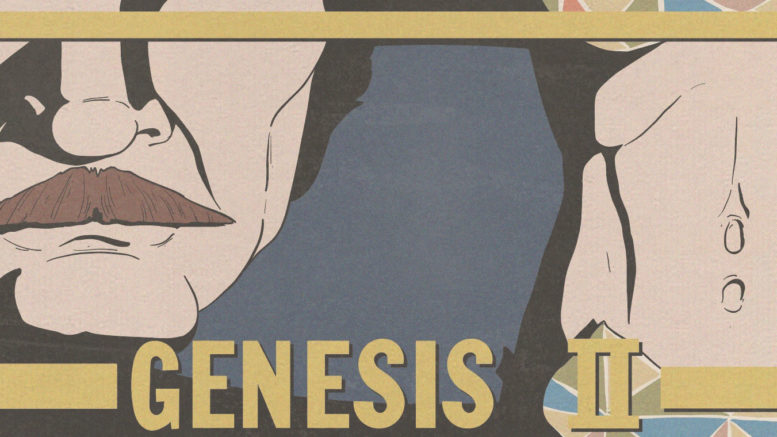
| November 17, 2016 | By: Mark Farinas 90 comments so far
So little has been written about Gene Roddenberry’s work outside of Star Trek , and yet the guy produced a movie and four television pilots in the ten short years between the original Star Trek and The Motion Picture . On this, the fiftieth anniversary of his most renowned creation, it’s time to reconnect with Roddenberry’s lost productions and see how they laid down the blueprint for Star Trek’s Next Generation.
Starting us off is Roddenberry’s first attempt at a TV show after Star Trek , 1973’s Genesis II which, despite the odd roman numeral at the end, is not a sequel to anything previously produced. Apparently the pilot film did extremely well, ratings-wise, and was green-lit with several story outlines ready to be filmed. Unfortunately, CBS decided Genesis II allowed is not and went with a Planet of the Apes show instead. I find the pilot’s reported popularity very interesting because it’s not particularly great. The opening is a mixed up jumble of scenes and narration, some of the concepts are downright laughable, and the hero flip flops so often between allegiances it can be hard to keep up. To be really frank, nothing Roddenberry produced outside of Star Trek was flat out amazing, but it’s all still worth watching because they have a very Roddenberry quality about them that’s both familiar and comforting no matter how goofy things get.

Genesis II is the story of contemporary NASA scientist Dylan Hunt, here played by Alex Cord, getting trapped inside his own suspended animation experiment for 160 years. If the name Dylan Hunt sounds familiar to you it’s because it was later used for Kevin Sorbo’s character in the 2000 series Andromeda .
Hunt sleeps in his stasis chamber until the year 2133. The earth, at this point, has experienced a massive nuclear war and is only now starting to rebuild. Hunt is accidentally woken up by a group of underground dwellers called the PAX. They are amazed to find what they believed to be a dead body still barely breathing. Like Spock telling McCoy how to replace his own brain, a half-conscious Hunt attempts to tell the PAX, through barely audible grunts, how to revive him; however, the PAX have no knowledge of medicine and can’t comply.
Fortunately one of the biological concepts that makes the xenon gas-based hibernation work is – I’m not making this up – the “need to reproduce”. Hunt grabs the shoulder of a leggy blonde PAX, played by Mariette Hartley (Zarabeth from “All Our Yesterdays”), begs her to make him “want to live”, and he soon recovers. Yes, folks, Dylan Hunt survives because he’s horny.
Hunt himself is a fury chested, mustachioed sex god, the like of which can be seen in the previous year’s Deep Throat and Roddenberry’s own 1971 film Pretty Maids all In a Row . He’s the very embodiment of a man willing to screw a brave new world into submission. It’s no secret that Gene’s expression of sexuality had all the poignance and complexity of kid peaking at his dad’s Playboys. It’s splatted all over his 70’s and 80’s work including Lt. Illia’s bizarre vow of chastity in The Motion Picture , and the various sex-comedy tweaks Gene made to first season Next Generation episodes like “Justice” and “The Naked Now”.

Because of this it should come as no shock that Hartley’s Lyra-a drops her robe the moment she’s alone with Hunt revealing her twin belly buttons of doom. The legend Roddenberry created around this aesthetic decision was that NBC wouldn’t allow him to show Hartley’s single navel on Star Trek. So when he got his chance he stuck two on her Genesis II character. This, of course, seems like nonsense considering there were many , many , many , many belly buttons on Star Trek. Many . Hartley, herself, can’t remember the incident , so I’d chalk it up to Gene creating another fantasy about his war with the censors.

Like the crew of the Enterprise, the PAX leadership, headed by Percy “Commodore Stone” Rodriguez, is a rainbow coalition of ethnicities and accents. Roddenberry’s belief in a future of racial harmony and cooperation was definitely a legitimate and heartfelt one. It’s a shame, then, that the PAX’s first issue of business is discussing whether Lyra-a can be trusted due to her being a half-breed cross between a PAX mother and a mutant from the city of Tyrania (as in “tyranny”, get it?). There’s an actual genetically reductive discussion about how her twin-naveled evil might override her human purity. “An oath means nothing to a mutant!” exclaims the Greek one. ”Her people practice deceit as a virtue!” says the Asian one.
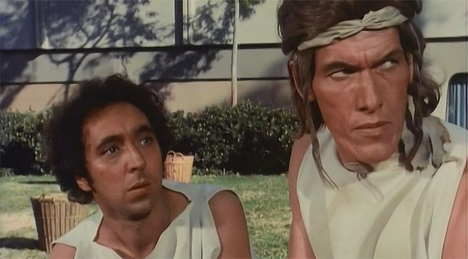
Later on Ted Cassidy’s character, who’s violent stoicism is an obvious prototype of Lt. Worf, will be referred to as a “White Comanche” who’s very heritage makes him an “ideal warrior”. That description may work ok for you when applied to a bumpy-headed alien, but when it’s pointed at a white guy with a head band playing a Native American it just seems icky. These are some embarrassingly mixed messages from the guy whose more ardent fans consider him the most racially progressive writer to ever grace Hollywood. Gene, no doubt didn’t mean to be so tone deaf and, for me at least, his dedication to racial harmony is nothing but sincere. But if you’re going to talk about a man’s vision you’re going to have to eventually bring up his myopia.
Worst of all, Lyra-a really is an evil, mutant temptress in the same vein of many female antagonists in the Original Series. She convinces Hunt, almost solely with the power of her bare midriff, that the PAX are the villains and that he needs escape with her to the mutant’s city. Much of the discussion of Lyra-a is similar to that of Spock’s dual genetic/cultural nature, but with a lot less nuance. Her mutant side apparently drives her to trick and seduce Hunt into helping her people, but her human half just wants the love, strange love, a well-groomed NASA mustache teaches. It’s all the pain and frustration of a mixed race individual condensed into a good girl/bad girl trope.
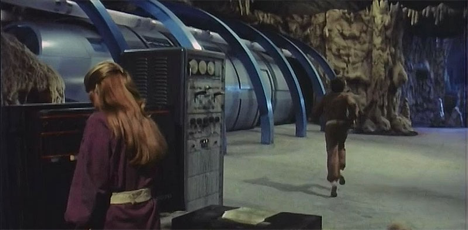
What really sets Hunt against the PAX, however, isn’t Lyra-a’s arguments but the fact that the PAX have abandoned all their “animal lust” which they blame for the war that leveled the planet. Their civility stems from their gender egalitarian nature where men and women dress the same, talk the same, and do the same work. All this equality somehow precludes serious boning. This, unfortunately, is a common misconception that still exists today – women are sexless by nature and only through the prowess of a man will there ever be physical love. By extension, a society in which the sexes are equally respected will be bland and passionless as the male libido will be automatically repressed. So when Hunt can’t seduce his pure PAX caretaker he immediately makes a run for the mutant city of Tyrania. Again, the plot literally revolves around Hunt’s fickle pickle.
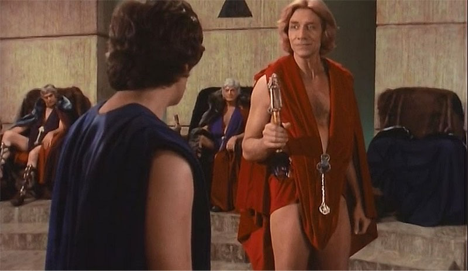
To his credit, Roddenberry, with the help of master designer William Ware Theiss, was as interested in sexually objectifying men as he was women. While the PAX have their sexless, brown jumpsuits, everyone in Tyrania, including Dylan Hunt, struts around in barely-there togas that would make Zardoz blush. While the original Star Trek’s miniskirts and overly revealing dresses are impossible to defend, it should be acknowledged that William Shatner’s clean shaven chest was on display as often as could be rationalized. This attitude would continue into Next Generation where both the guys and the gals wore short skirts and skin tight spandex. It’s interesting to note that in Next Gen’s third season, as Gene’s influence waned, the skants disappeared, the alien costumes became more conservative, and only the women continued to wear tight uniforms.
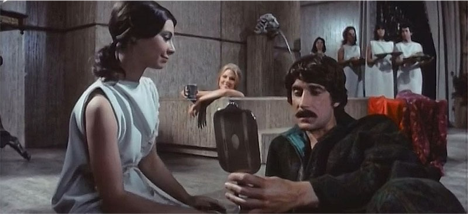
After a few happy days lounging in retro-futurist Roman splendor getting his mustache trimmed and being hand fed by white-clad nymphs, Hunt starts to realize Tyrania is not all it’s cracked up to be. There is a rigid caste system and institutionalized slavery is rampant. When Hunt refuses to fix the Tyranian’s aging nuclear plant one of their luxuriously coiffed leaders attacks him with a sadomasochistic weapon called “the stim” which is capable of delivering pleasure as well as pain (again, shades of Spock’s Brain ). He’s rescued by undercover PAX agents who are there to foster a slave revolt. Hunt agrees to help them, makes a magic weapon-sensing device, gets captured and freed again, and finally convinces the slaves to rise up and flee.
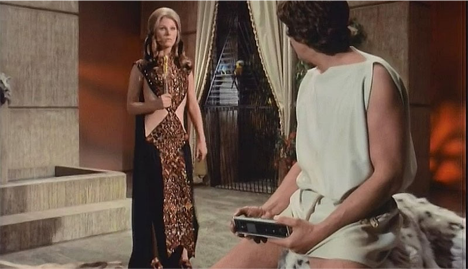
In the end Hunt tricks Lyra-a into expressing love for him by claiming his “weapon detector” is actually a “truth detector”. Because he sees her feelings are real and “human” he finally agrees to abandon his new PAX friends in order to fix the Tyranian nuclear reactor. Days go by and the PAX consider Hunt dead until he shows up at their base asking if they saw the nuclear blast he set off. Apparently, in one last act of deceit, the Tyranias actually wanted him to fix a left over nuclear warhead that was aimed at the PAX. Several technicians were killed in the blast, much to the disapproval of the PAX leadership who abhor the violence of the olden days.
Pacifism is another of Roddenberry’s core beliefs and it’s the only one that is completely immune to criticism and cynicism. When Hunt insists he did what he had to to save their bacon the PAX tell him they are all willing to give their lives before taking the lives of others no matter what the reason. The discussion is ended when the nuclear shock wave finally hits the PAX base, blowing everyone over and terrifying a group of children. The sight of the PAX children huddling in fear of what Hunt has done convinces him to only reconstitute the best achievements of his time and abandon the violence of the past for this new way of peaceful coexistence.
This is a really well earned and completely earnest moment as well as a very interesting turn for a Roddenberry hero. Kirk and Picard are civilized men who almost always have answers to the big questions. Their pontifications on humanity are legendary. Hunt is a different breed. He is the kind of savage who destroyed this world. Despite all his advanced technical knowledge it is he who will need to be civilized.
Almost all pilots are sloppy affairs. They need to create new characters, worlds, and antagonisms and often, as is the case with Genesis II , in only one hour. This final moment tells me the show, no matter how flawed, would have had real potential to do something different: teach the world Roddenberry’s utopian views by learning with the lead character instead of by being preached to by him. That’s a show I’d happily watch the crap out of.
Of course, Hunt ruins the entire mood in the closing shot by trapping a PAX woman in an elevator and making a really gross pass at her with the line “I bet you have a great pancreas”. Nice one, Gene.
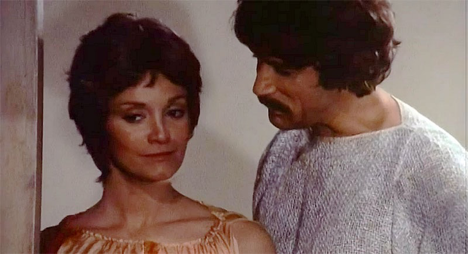
Here’s some of my stray, uncategorized thoughts and observations:
• Majel Barrett is part of the PAX leadership. She doesn’t do much, but it’s great to see her.
• “Women’s Country” is alluded to. This will come up again in the second pilot attempt for this series, Planet Earth .
• The hyperloop style “subshuttle” that can take characters across the world in minutes is a very cool effect that must have cost a lot of the budget. You can be sure stock footage of it would have been used the same way the Enterprise was in future episodes.
• The PAX have no knowledge of medicine or medical equipment. Intravenous needles are alien to them. Percy Rodriguez is utterly shocked that Hunt wants them to “inject an alien substance into his body”. Yet their only hand weapon is a hypodermic needle that delivers a knock-out drug. This is an inconsistency that would have become harder to explain in a long running series.
• It’s also odd that the PAX are so unwilling to take a single life to protect themselves, yet they’re ok with unleashing thousands of armed, blood-thirsty slaves on the Tyranians.
• The show’s opening title font is Rude Extra Condensed Black if you’re the kind of person who cares about such things.
Up next: Spectre .
Related Articles
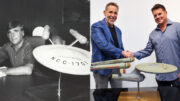
History , TOS
Lost Original USS Enterprise Model From ‘Star Trek’ Returned To Gene Roddenberry’s Son

Kelvin Universe , Star Trek 4 , Upcoming movies
Paramount Has A Plan To Bring Star Trek Back To The Big Screen, Says Roddenberry Entertainment Exec
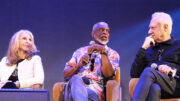
Conventions/Events/Attractions , Star Trek Universe TV , Star Trek: Legacy , Star Trek: Picard , TNG , Trek on TV , Upcoming TV projects
‘Picard’ Cast Talks “Cozy” Enterprise-D, Gates Hosts “Genesis” Watch Party, And More Star Trek Cruise Day 6
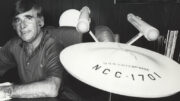
History , Memorabilia , TOS
Rod Roddenberry In Talks To Recover What May Be The Lost Original Enterprise Model From ‘Star Trek’ [UPDATED]
If memory serves, the good ratings were because Star Trek was about at its peak in syndication around then, and the Roddenberry name drew in a lot of fans. Genesis II wasn’t all that good, but neither was “Encounter at Farpoint”. It could have turned into a good show if given the chance. Well, probably not. Regarding the racial insensitivity, it was a product of its time. Even the uber-liberal “M*A*S*H” had a character named “Speerchucker” at first.
Not to defend MASH, but it was about a time 30 years prior to its air date. Genesis II was written by someone who was supposed to be ahead of his time. It’s hardly a fair comparison. I’ve never been convinced by the “product of its times” argument for excusing bad ideas. In every backwards era you can find works that don’t do those things. I’d hate for people in the future to wave away our bigotry based on our current political climate.
Spearchucker is also a remnant of the original novel. And I think it jives when you consider that the book is about a bunch of entitled white guys (entitled white SURGEONS) in the 50s making sardonic observations about a world they clearly consider “theirs”. Trapper is so named — if I remember correctly — for literally trapping a girl and not letting her go until she has sex with him. We’d call that rape now, I believe. Father Mulcahey is also nicknamed “Dego Red”. It was kind of a crappy book, steeped in casual mysogny and bigotry. Which I guess helps your point, considering how homogenized the TV show became.
They called him Spearchucker because he threw javelin in college.
Re: he threw javelin in college.
There’s no pussyfooting around about it. It was because he threw javelin in college and was black.
Er, pardon my ignorance, but is “spear-chucker” a racial epithet? I (naively, perhaps) hadn’t heard that before.
Re: is “spear-chucker” a racial epithet?
Yes, scroll down:
https://en.wikipedia.org/wiki/List_of_ethnic_slurs#S
and you’ll find it.
You must be young.
I’ve seen Genesis II in the late nineties when it was shown on the BBC. As the article says and what also my first impression was, is that it clearly had the Roddenberry traits. But also I have to say, it was pretty boring and unlike Star Trek, Genesis II has aged terribly. I wouldn’t even recommend watching it even if you are a die-hard Trek fan, I’d say watch something like Logan’s Run instead.
Logan’s Run hasn’t aged well, either. Very clearly a product of the “don’t trust anyone over 30!” generation. Only in Logan’s Run, they kill you at 30.
LR (the movie) was state of the art at the time, but has aged horribly, a combination of too much chrome, too many colors, and too much hair!
Logan’s Run (the movie) tells a timeless story and has that retro-futurism feeling that I also enjoy with TOS. :)
Let me say that I do not DISlike the LR movie or series at all, in fact Logan’s Run was the very first Blu-ray I watched when I bought a Blu player a couple of years ago. (Talk about optic shock!) I remember when I saw it in 1976 with a “lifeclock sticker” theater giveaway planted in the palm of my hand. I couldn’t go back to my film school classes and mention it without being met with laughter. Still, I enjoy watching it more than I do 90% of today’s movies.
If there was ever a time travel story set in the Motion Picture time period – Earth/Federation fashion would be indistinguishable from Logan’s run. This is demonstrated by the Earth scene in ST:TMP.
Logan’s Run won a Special Achievement Oscar for Visual Effects. That was one year before Star Wars came out.
The same year KING KONG also did, and neither deserved it. The matte shots in LOGAN had us laughing out loud opening day, the characters were like postage stamps stuck on, and there was no attempt to scale the water in the miniature city or put some kind of atmosphere in to take the edge off.Except for the great matte paintings and some practical explosions, the vfx were not at all oscar worthy.
Re: it clearly had the Roddenberry traits
It wasn’t just that. When Gene realized he was going to be allowed to actually put something called STAR TREK back on the air again, he very obviously decided that he was going to use STNG to get his shot down story ideas for GENESIS II and THE QUESTOR TAPES on the air. As Yogi Berra was prone to say, “It was deja vu all over again.”
Well chosen elements of this show along with Logan’s Run tacked
onto Star Trek Discovery could be interesting IF done with the
much needed care and adequate forethought. Thoughts on this…?
My preference was always for the second, “Planet Earth” .
Agreed, PLANET EARTH was at least kinda fun. But I flat-out love the end of QUESTOR TAPES, when the antagonist turns out to be a man of genuine ethical stature. Pure Gene Coon, there, I’m sure.
John Saxon > Alex Cord
Mark Farinas,
Re: contemplating the navel
You are forgetting STAR TREK’s whole raison d’etre, i.e. to use science-fiction to get around Broadcast Standards Department censors, and then confusing the fact that they actually succeeded in winning some battles with there being no battles to win.
The no costume titillatingly revealing a woman’s navel rule at NBC was as real as Barbara Eden’s navel covering harem costume there. Of course, what made a navel reveal titillating was in the eye of whoever was reviewing the show for BSD, and so such things were infuriatingly, arbitrarily and inconsistently applied – but that doesn’t mean the battles didn’t occur and that such inanity didn’t have to be addressed. And yes, such things as a censor finding two navels so odd as to be repugnant and thusly ruled incapable of titillating and given a pass did occur as inane as it now all seems.
FWIW, it is documented in Poe’s, aka Stephen E. Whitfield, 1968 tome, THE MAKING OF STAR TREK on page 360: “The navel is also taboo. Why the navel should be even remotely considered a sensual area is a little beyond comprehension. After all many people feel that the navel is not the most attractive thing in the world. Nevertheless, you are not supposed to show it or call undue attention to it.”
Trek’s costume designer, Bill Theiss, explains his theory of titillation there as “…the degree to which a costume is considered sexy is directly dependent upon how accident-prone it appears to be.”
You have to take everything Gene has said with a grain of salt. Some of it is hyperbole, some of it is outright lying. For instance having to fight NBC to get a mixed race crew on the show. The networks were scrambling for multi-culti material at the time. I Spy, Mission Impossible, Laugh In, The Green Hornet are all Star Trek contemporaries with multiracial casts. Gene also probably lied about NBC not wanting a woman as second in command in The Cage. They were fine with it. They just didn’t like Majel’s acting. So when I see a multitude of examples of something Gene said the networks wouldn’t do with the actress herself unable to corroborate on a season Gene had a very small active role on, I tend to toss it in the “myths” pile.
Love Star Trek. Not Wild about Roddenberry
You also have to take everything the networks and their execs put out about their “reconstituted past”, as the writers Bob and Wanda Duncan put it, with just as much salt. William S. Paley comes to mind as notorious for re-spinning things to make him look good when the truth was he was behaving anything but admirably.
And again, I remind people don’t make the mistake of assuming because some 1960s Broadcast Standards Department battles were won in that something taboo aired that such taboos ended because of it, or never existed in the first place.
Except that it’s not the network who called Gene out. Most of that info comes from Herb Solow who was part of Desilu, not NBC, and Robert Justman, who was Gene’s partner all the way into TNG. Their book Star Trek: The Real Story is a very interesting read if you’re interested in a different take from people who were there.
Re: Herb Solow who was part of Desilu, not NBC
I don’t know what you are trying to peddle or what was peddled to you but Herb Solow was hired by Desilu because of his long prior employment as a program director at NBC and for his contacts engendered there.
You are wrong when you tried to infer that because Herb was employed by Desilu that he therefore did not have a very pro NBC executive view.
I have read Herb Solow. His observations for me have the very Paleyesque aesthetic, he had worked for CBS as well, of a network executive of the era which he had been.
This is not to say that either man’s view was all wrong or all right but that the truth lies somewhere between the two.
Solow’s book title makes it very clear that the two co-authors approached it with an ax to grind, which is why I feel it needs to be taken with equal quantities of salt.
And Herb was fallible. He could get things wrong. In interviews, he claimed Lucy didn’t have a funny bone in her body and couldn’t tell an off-the-cuff funny story and get a laugh to save her life. Well, I saw her on CBS’ DECADES network in a 1970s rerun of THE DICK CAVETT SHOW devoted entirely to interviewing her, and Herb was dead wrong. She might not be able to do stand up, but she could elicit laughs responding to Cavett.
Herb also claimed Gene didn’t fool NBC with the Majel/Chapel hair color change but also said that he saved Gene from being fired by Lucy because Gene had gotten away with it.
And as for Justman being Gene’s partner, well, so was Majel.
You’re comparing an opinion – Lucy isn’t funny – to a set of facts that are observable and objective. I also find that axes are ground because they need to be. There is no real reason for these two guys to go after Roddenberry if it wasn’t true. Gene was out for Gene. Everyone else would, therefore, need to be in a vast conspiracy against him – including the facts that are easy to find. I think I take a pretty measured approach to Gene, but some things are undeniable and I’ll touch on them more in later reviews. But, at this point you and I are just discussing who can dole out the best ad hominems against their sources.
Re: Gene was out for Gene
I don’t contest that. Nor do I contest that he spun things to favor himself and got some things things clearly wrong in service to that end.
I only point out that likewise Solow was out for Solow.
Let’s be honest: one couldn’t be a successful entertainment executive in the male dominated industry of the era without the facility to self-promote and spin with a healthy dose of blowing one’s own horn.
And like Gene, Herb could tell contradictory tales. Which version about Majel’s hair color recasting is accurate (Did Gene get away with it or didn’t he?) and why would Solow go to Herculean efforts to battle for Gene’s job with Lucy’s personal publicist, Howard McClay, over it when, I don’t think I’m overstating this but acknowledge the possibility in attempting to properly gauge his spin on Roddenberry and associated events, he claimed Gene was a no talent hack who had one good idea in regards to the production of the first STAR TREK series?
I was born in the 1950s and lived aware in the era of the 60s and beyond. All that I am trying to demonstrate about interpreting facts from back then is, for example, that it is a non sequitur to conclude that because I can show that some writers who claimed they were blacklisted got paychecks writing under pen names that therefore HUAC’s tilled blacklists never existed and no one lost work because of them.
But if it’s documentation you desire, from a tome first published in 1970, FROM THOSE WONDERFUL FOLKS WHO GAVE YOU PEARL HARBOR By Jerry Della Femina with BELLY BUTTON emphasis from moi:
https://books.google.com/books?id=QL-5lfFsoukC&printsec=frontcover#v=onepage&q&f=false
“You don’t spend $50,000 or $60,000 to make a commercial and just put it on the air. It’s not that easy. There are rules and regulations and censorship. There is so much of this that it’s goddamn funny and stupid. Sooner or later every commercial is passed on by someone. The National Association of Broadcasters is the national bunch of censors and they pass on commercials on certain sensitive subjects, like cigarette advertising, personal products, feminine hygiene products, and parts of the body like the BELLY BUTTON. The National Association is very strong on BELLY BUTTONS. If you get by the N.A.B., then you’ve got to deal with the networks, which have their own censors. And the individual stations, they’ve got their censors too.
One of the biggest problems that all agencies have is the headache of censorship. There is simply no reason to it. Censorship, any kind of censorship, is pure whim and fancy. It’s one guy’s idea of what is right for him. It’s based on everything arbitrary. There are no rules, no standards, no laws. The problem is, the Code of the National association of Broadcasters changes every week; each week a new directive comes out of the N.A.B. I don’t follow any rules or standards or laws when I do commercials because how can I? What is O.K. this week may not be good next week. There are no rules.” — FROM THOSE WONDERFUL FOLKS WHO GAVE YOU PEARL HARBOR By Jerry Della Femina, Simon&Schuster, p192
“What they didn’t figure on was the NBC censor, who takes one look at the commercial and says, “That’s a BELLY BUTTON. My God, you can’t show a BELLY BUTTON.” The theory was that kids might be watching and would see the BELLY BUTTON. Of course the NBC censor didn’t realize that when kids go into their tub every night they look down and they see their BELLY BUTTONS. “ — FROM THOSE WONDERFUL FOLKS WHO GAVE YOU PEARL HARBOR By Jerry Della Femina, Simon&Schuster, pp200 – 201
These passages were also excerpted in newspapers’ of the year 1970.
I might pick that book up.
Re: Gene also probably lied about NBC not wanting a woman as second in command in The Cage.
You really ought to rethink this Gene probably lied bias you have, because in this STARLOG INTERVIEW Solow says:
https://archive.org/stream/starlog_magazine-241/241#page/n73/mode/2up
“Majel Barrett was dropped as Number One because the network had trouble with a female in a position of authority.” – Herbert F. Solow, from THE MAN WHO BOUGHT STARTREK by Ian Spelling, STARLOG #241, P74, August 1997
You really ought to rethink this Gene probably lied bias you have, because in this STARLOG INTERVIEW Solow says [|=i]:
https://arch |ve.org/stream/starlog_magazine-241/241#page/n73/mode/2up
“Majel Barrett was dropped as Number One because the network had trouble with a female in a position of authority.” – Herbert F. Solow, from THE MAN WHO BOUGHT STARTREK by Ian Spelling, STARLOG #241, P74, August 1997
Solow clearly had misconceptions about what it was like to deal with NBC’s censors:
“NBC’s censors were just doing their job. The censors dealt us as they did with every other series on at the time. Roddenberry developed scapegoats. The censors at NBC were the main scapegoats. When we made a deal with NBC, we had to adhere to the NAB Code — the National Association of Broadcasters Code — that this is what you can and cannot do. Gene knew about it and even signed a letter agreeing to adhere to the NAB Code. Every show adhered to it. Roddenberry felt he was above that and would do what he pleased. When they said, “No, you can’t do this,” he went to the fans and said, “They’re terrible human beings. They are stopping my creative process.” He was 100 percent wrong. The book spells that out in detail, and it was about time.” – Herbert F. Solow, from THE MAN WHO BOUGHT STARTREK by Ian Spelling, STARLOG #241, P74, August 1997
Femina in 1970, who doesn’t have a dog in either Solow or Roddenberry’s race for STAR TREK glory, shows that the picture Herb tried to paint that all Gene had to do was adhere to the NAB Code and he’d have no problem was just plain untrue:
“Most of the time, though, you can’t fake a censor out so easily. Smith/Greenland, a very good agency, was doing a commercial for Fresh, which is a deodorant. Why is it such clean products have such big troubles? Anyhow, they got past Miss Cheng [the NAB’s censor], I mean they showed Miss Cheng what they wanted to do and she said, ‘Terrific.’
They wanted to picture a belly dancer at her work, showing that she leads a strenuous, active life. … They cut the commercial at a great deal of money, and when Miss Cheng saw the cut she said swell.
They figured they were in. What they didn’t figure on was the NBC censor, who takes one look at the commercial and says, ‘That’s a belly button. My God, you can’t show a belly button.’” — FROM THOSE WONDERFUL FOLKS WHO GAVE YOU PEARL HARBOR By Jerry Della Femina, Simon&Schuster, pp200 – 201
Arrival was a great movie. Intelligent science fiction with a good message. Kinda like the last three Trek movies.
Don’t you mean like the last 3 trek movies could have been?
No like the Trek movies BEFORE the last 3 could have been. What wasted potential the last few decades.
I couldn’t even recall if I’d sen this show, or not. Then, I saw the still photo of the double navel…..
Ted Cassidy was a highly underrated talent.
I always would have preferred an ASSIGNMENT:Earth show.
I will say it. Star Trek was a mistake for him. I whole heatedly believe that when looking at the rest of his resume. It was the only thing he wrote or created that was any good. And even then, neither show really hit their stride until someone else took over the day to day running of the show. It happened on TOS and it happened again on TNG.
GR certainly milked it.
I disagree. Like I said in the review I like the show. I think it could have gone somewhere really interesting. Also, Gene was running things day to day on TOS until the third season, which is considered the weakest. TNG under Gene was cringy, corny, and sometimes so wrong, but it was at least fun. After season 3 you can see that fun and whimsy slowly drain out of the franchise in favor of faux serious subplots and tech-the-tech puzzles. Gene was great when he had the right team. Without him at all things rarely flourished.
He was certainly not running it day to day (probably would never have approved TRIBBLES), not after the first dozen or so shows. That was Coon, and then JMJ. Gene’s problem with Coon and the humor (basically, the life in the characters that made the whole thing memorable and a lasting phenomena) seems to be indicative of the fact he didn’t know what he had or how it was developing, or more importantly, WHY.
According to Shatner and other sources the show only started to gel once Gene Coon took over the bulk of the producing.
Join the discussion Gene was a writer on a very popular western series in the late 50’s, “Have Gun Will Travel” starring Richard Boone as Palladin, so Gene did have some success in LA prior to striking gold with “Star Trek” in ’66.
Yes, he had some success. But success doesn’t mean good. I haven’t seen much of his early episodic writing. But I have read a couple of scripts from The Leutenant. They seemed underwhelming to me. And pretty much everything he touched after TOS that wasn’t Trek was terrible. Just my opinion.
I believe the digital channel Get TV actually shows The Lieutenant on weekends, if you’re interested. I just saw of an episode with Walter Koenig.
Indeed it does, and the OTA Digital channel HEROES & ICONS, which airs all the Trek series daily, shows HAVE GUN WILL TRAVEL every morning too.
Kind of a snarky review but still always glad to see Genesis II remembered. I guess i’m one of the few Genesis II fans. I love it and finally own it on DVD as well. I was 12 when it premiered on TV and thought it was great. Loved the Sub-shuttle and entire premise. Unlike many of you I did not like the 2nd attempt Earth II with John Saxon.
Ironic that CBS axed Genesis II for the Planet of the Apes series. I was (and still am) a big Planet of the Apes fan and was excited for that series as well but ended up hating it by the 2nd or 3rd episode.
@OldTrekker
You are not alone. I must have been 16 or 17 when it premiered, and I set aside family social commitments to sit glued to our new Magnavox console color TV. I too am a POTA fan, and loved spotting pieces of the LIS sets and props turning up on Apes episodes.
Remember the G-II Sub-shuttle TV Guide article, about the pickup truck pulling the shuttle through the set on a rope? Fun little behind-the-scenes glimpse there. ;)
OldTrekker,
You can get a different take from TrekMovie’s earlier forgotten review of it and its progeny from 2009:
https://trekmovie.com/2009/10/23/reviews-gene-roddenberrys-genesis-ii-planet-earth/
Earth II was TV movie with Gary Lockwood that didn’t involve Roddenberry. The third movie was “Strange New World”.
You are correct. I meant Planet Earth. Thx.
Re:Earth II
Wasn’t there also an unrelated to either TV pilot movie and series also called EARTH II that starred Debrah Farentino?
Earth 2 (not II) lasted a full season on NBC in 1994-95. Also starred Jessica Steen and Rebecca Gayheart. It was okay.
I saw it the night it premiered on network TV; loved it then and love it now, in some ways more than ST-TOS. Sad that G-II never got the chance to explore that world in a season or more of one hour episodes. The two follow-up attempts (Planet Earth and Strange New World) were disappointing.
It was filmed in my backyard with the University of California, Riverside serving the role of Tyrannia. After it aired, I always got a kick whenever I had an excuse to visit the campus and be transported to the future.
Also strangely prescient, as I started attended the local JC and the UC provided remote batch access to their IBM 360 model 30 for the computer classes taught there, and Tyrannia started oppressively adding and hiking up fees for that access such as $1200/mo for “security” (for which there was none).
I was disappointed in losing some of the elements that I liked in the subsequent attempts to get the concept a series commitment, but I found the fact that it essentially got 3 pilot movies made novel, and fascinating that Roddenberry had managed to break the two pilot ground, yet again. It even managed a 3rd with out him.
PLANET EARTH, left me with this odd feeling that it had actually gone to series. I think that was because its movie seemed like a bunch of episodes strung together to make a movie. I like John Saxon but I wanted an opportunity to see where Cord would have taken his character.
@Disinvited
Planet Earth was pretty silly IMHO, but not as bad as Strange New World. I don’t think either Cord or Saxon are anything to brag about, but I find Cord a bit more credible, if somewhat boring.
“Starting us off is Roddenberry’s first attempt at a TV show after Star Trek, 1973’s Genesis II which, despite the odd roman numeral at the end, is not a sequel to anything previously produced.”
Genesis allowed is not!
Hey this wouldn’t be a Roddenberry comment chain if someone doesn’t point out that II is an EVEN Roman numeral. ;-)
http://www.roddenberry.com/media/vault/STIII-Correspondence.pdf
http://www.roddenberry.com/media/vault/CorrespondenceRoddenberryNimoy.pdf
Thanks for those, B!
The more old correspondence of GR’s that I have read, the more annoyed I grow at the people who constantly look for flaws in his work and personality. I think he’s quite diplomatic in most of the memos I’ve seen. Nobody is perfect, and to expect otherwise and actively seek flaws – especially in someone long dead – is more an issue of the one doing the targeting than it is with the person being targeted. The man we call The Bird gave us something often exemplary, and without him there would have been no Star Trek at all. I love these memos and such.
Again, many thanks!
There is nothing which makes Gene admirable & much which shows the opposite. From his rampant infidelity to his total “dick move” of writing unused lyrics for the TOS theme song so he could get half of the royalties (which permanently alienated Courage) and more. Gene was a real piece of work & nothing in these correspondences will change that.
Re: permanently alienated Courage
This is 100% pure prime B.S.:
http://startrekfactcheck.blogspot.com/2013/06/alexander-courages-marvelous-malarkey.html
” There wasn’t any rift, really, with Gene. What happened with Gene was a I got a phone call once…it was Gene’s lawyer, [Leonard] Maizlish. He said, ‘I’m calling you to tell you that since you signed a piece of paper back there saying that if Gene ever wrote a lyric to your theme that he would split your royalties on the theme.’
Gene and I weren’t enemies in any sort of way. It was just one of those things…I think it was Maizlish, probably, who put him up to doing it that way, and it’s a shame, because actually if he’d written a decent lyric we could have both made more money.” — Alexander Courage, Archive of American Television Interview (February 8, 2000)
And another reason why I say the Solow/Justman book needs to be examined with critical eye and its pronouncements NOT just automatically accepted as gospel.
True, the Solow/Justman book doesn’t wash. From a friend of mine who knew one of them too well, I don’t give the book much credibility. It’s mostly a gripe session.
Re: his rampant infidelity
Not admirable, but not unusual behavior in successful creative television talent executives of the era:
https://books.google.com/books?id=QL-5lfFsoukC&lpg=PP1&pg=PA4#v=onepage&q&f=false
http://www.npr.org/templates/transcript/transcript.php?storyId=128695927
“Literally, from when we started the agency in 1967, we had an agency sex contest. And what did that mean? So, they would literally get a telephone list, and we’re talking about as many as 300 employees. And they would vote for the person they most wanted to go to bed with. And so the two winners, the male winner and the female winner, even though they might not have voted for each other, won a weekend at the Plaza Hotel. It was quote, our secret, and it was sophomoric, but then we would all gather at a Mexican restaurant and lock the doors and we would have this wild, wild, wild party where I would then get up there and after God knows how many margaritas, I would announce the winners. And everybody’s cheering. And the story I always like to tell was at one point, there was an older executive who I think possibly might have imbibed his first taste of cannabis, and he had a lot to drink. And at one point, his head went right into his dish. And sitting next to him was this woman who was our research director, and she said, it’s okay, it’s okay, he’s fine – the guacamole broke his fall. ” — Della Femina, author of FROM THOSE WONDERFUL FOLKS WHO GAVE YOU PEARL HARBOR
Or the Desi for which Desilu itself was named, and I would certainly arch an eyebrow if Solow claimed absolutely none of the NBC executives supposedly complaining about Gene’s had mistresses.
@”Who cares”
But without him and his creation, you wouldn’t be on this page. :)
I’m a fan of the entire Trek franchise, but I’m not going to act like Gene was doing anything prophetic or that he had some vision (other than making money & getting laid) or any of the rest of that “Great Bird” nonsense. As for Courage, considering he never worked on Trek again I’d say its fairly obvious that no matter what diplomatic language people want use now that Gene’s sneaky underhanded moves cost Trek more of Courage’s work. Just as Gene lost several writers in early TNG because he had apparently authorized his lawyer to make rewrites in his name.
Re: he [Courage] never worked on Trek again
Again, 100% pure prime B.S. read the STAR TREK Fact Check:
“Although it is true that Alexander Courage didn’t return to score any individual episodes during the second season of Star Trek, he did record thirty minutes of library music for it — some newly composed — on June 16, 1967. And, during the program’s final season, Courage returned to score two more episodes: ‘The Enterprise Incident’ (recorded August 5, 1968) and ‘Plato’s Stepchildren’ (recorded October 25, 1968). Bob Justman had left the series by the time the score for ‘Plato’s Stepchildren’ was recorded, but he was definitely around during the recording sessions for ‘The Enterprise Incident.'” — Michael Kmet, ALEXANDER COURAGE’S ‘Marvelous Malarkey’, STARTREKFACTCHECK.COM, Tuesday, June 25, 2013
I’m not asking you to not critically examine Roddenberry’s claims about himself. But I am asking you to give the same scrutiny to your other other sources which have led you to make 3 demonstrably false claims about Courage.
@Disinvited:
Methinks “Who Cares” has an axe to grind, but he/she isn’t alone there. Is he? ;)
I think Disinvited has a little too much faith in the Roddenberry myth-making machine, but Courage is something he’s right about. Check the TMP liner notes. Sandy came back to personally orchestrate his theme music in the “Captain’s Log” tracks. That’s hardly “never working on Trek again.” As for the stories about Maizlish rewriting scripts, I have a feeling they are way overblown if not completely wrong. I’ll get into that more in later articles.
Re: Disinvited has a little too much faith in the Roddenberry myth-making machine
Why do you keep going there when I clearly don’t take a faith based approach to him?
“This is not to say that either man’s [Gene Roddenberry or Herb Solow] view was all wrong or all right but that the truth lies somewhere between the two.” — Disinvited
“I don’t contest that [Re: Gene was out for Gene]. Nor do I contest that he spun things to favor himself and got some things things clearly wrong in service to that end.” — Disinvited
“Not admirable [Re: Gene Roddenberry’s rampant infidelity], but not unusual behavior in successful creative television talent executives of the era.” — Disinvited
“I’m not asking you to not critically examine Roddenberry’s claims about himself.” — Disinvited
You, however clearly take a faith based approach in attacking Roddenberry:
“Gene also probably lied about NBC not wanting a woman as second in command in The Cage.” — Mark Farinas
not even supported by the source where you claim you got that faith:
“Attacking Roddenberry”. That line says a lot about how you’re approaching this conversation. There are a lot of reasons to believe the Number One role was created for a lover, not for the love of seeing a woman in command. Roddenberry didn’t think much of women. Number One is a stand out in his career. Not once in any other TV show or movie did Gene create a compelling female character. They were all secretaries, jilted lovers, and succubi. Solow said, “for Gene, a woman’s role was primarily as a decorative tool in a man’s workshop”. Pike said some horribly sexist things in The Cage. The other two women in the episode are an underling pining for her boss and a love doll who won’t leave Talos because she won’t be pretty anymore. His next set of scripts contained space hookers. It’s one thing to to be forced to keep women out of the hero rolls in the 60’s. It’s another to slight them in nearly every episode. When TNG rolled around and he had no reason to not try again he didn’t. He described Crusher as having a stripper walk and wanted four breasts on Troi. Susan Sackett told him “You really put down women a lot for someone who is supposed to be thoughtful and liberal.” (Humanist, April 1991) So to say Gene was going to be a selfless pioneer in the field of women’s lib just doesn’t ring true to me. It’s not faith or an innate hatred that makes me doubt him. It’s a very educated decision.
Re: “Attacking Roddenberry”
Your lines “another [Roddenberry] fantasy” and “Gene also probably lied” betrays an approach as well.
You used “probably” to modify “lied” because you knew when you made that statement that you had nothing to offer by way of a proof for the lie claim. Your willingness to resort to innuendo there, in your article and in other responses to me says a lot about how you’re approaching this topic.
Re: Roddenberry didn’t think much of women.
How do you commiserate this view of the 1960s Roddenberry when, despite being a typical man of this time in the entertainment industry as you would permanently pigeonhole him, his secretary was promoted by him to scriptwriter and then again to story editor? And I certainly hope you realize that she most certainly adopted “D.C.” to address males, other than Roddenberry, in the industry who had problems with hiring women as writers when their place clearly was the secretarial pool where most male network power holding types wanted working women properly consigned both on and off screen?
Re: There are a lot of reasons to believe the Number One role was created for a lover, not for the love of seeing a woman in command.
The one does not follow or preclude the other. Cite one credible reason to believe this contention of yours other than the equally as self-contradictory as Gene, Solow. Heck, even you yourself claim this was an exception and NOT the rule that you are trying to make it out to be, i.e. you claim you can’t name one other mistress, either before or after Majel, for which Gene wrote an equally exceptional role.
Re: Solow said
I have already provided the citation where your source, Solow, indicated it was the NBC network, and not Gene, that proscribed STAR TREK’s female characters from better.
“Majel Barrett was dropped as Number One because the network had trouble with a female in a position of authority.” – Herbert F. Solow, from THE MAN WHO BOUGHT STAR TREK by Ian Spelling, STARLOG #241, P74, August 1997
Solow also falsely claimed, in service to the notion that you are attempting to peddle that Roddenberry only wrote well for his mistresses, that Grace Lee Whitney was one of them. She vehemently denied being his mistress.
Re: His next set of scripts contained space hookers
That you have no compunction repeating Solow’s mischaracterization about Stephen Kandel’s script based on Gene’s idea of Trek exploring the Old West’s mail-ordered brides phenomenon says a lot about how you’re approach, as well.
How do you reconcile your “fact” with one where your purported progressive network, NBC, maintained its untarnished women’s rights halo while not only failing to kill such a hooker tarnishing story, as you characterize it, immediately when it was pitched, but allowing it to develop and be aired zooming right by their uncloaked-belly-button-fearing, Mrs. Messerschmidt, astounds.
Re: So to say Gene was going to be a selfless pioneer in the field of women’s lib just doesn’t ring true to me.
Would you please spare me from these constant strawman introductions. I certainly made no such claim.
I have merely demonstrated that certain innuendos which you claim were highly likely or darn near incontrovertible, were, in fact, not.
However, I do wonder with reflection on your part if you can come to comprehend how Solow saying NBC was going to be a selfless pioneer in the field of women’s lib rings equally untrue for me?
Courage being back for TMP is ENTIRELY due to his friendship with Jerry Goldsmith (and also the latter not wanting to have anything personally to do with using the TOS theme; in 79 he said that if he knew he would be required to incorporate the Courage material in his score, he would not have taken the job.) I’m sure the composers probably figured this was a way to get Courage some money and then some, making up for the business-as-usual GR approach.
Re: Courage being back for TMP is ENTIRELY due to his friendship with Jerry Goldsmith
That’s not exactly what Sandy told STARLOG #107, in June of 1986. According to him it was those pesky letter writers:
https://archive.org/stream/starlog_magazine-107/107#page/n19/mode/2up
“I wasn’t asked to score the [STAR TREK] films because, by that time, I was kind of retired. And there’s a hierarchy involved. Certain people are feature picture scorers. When the first film was about to be scored, an acquaintance asked me if I was going to do it. I told them no, Jerry Goldsmith was doing it. Then, I was asked if they were going to use my theme, and I said, ‘Of course not! Jerry will write a new theme. Which is what he should do.’ When I did The Waltons, which had Jerry’s theme, I didn’t use his theme, except for the first couple episodes. So, why should he use my theme? But, they had so much mail, apparently, that he finally called me, rather reluctantly, and asked me if I would write a 15-second version of my theme and a 30-second version. It was used somewhere in the picture. Of course, James Horner [STARLOG #63] has used it in each of his films because they told him he had to, and that’s all there was to it.” — Alexander Courage in ALEXANDER COURAGE: and the music of STAR TREK by Randy & Jean-Marc Lofficier, STARLOG #107, June of 1986, p19
What you’re addressing is WHY the music was used, not why Courage himself was involved in the writing of it. That’s JG’s call, confirmed in some detail in RETURN TO TOMORROW … otherwise they could have had any hack cough out a variation on the TOS theme.
Re: they could have had any hack cough out a variation on the TOS theme
You are putting too much import on his TMP composing for economic reasons. Courage, along with fellow STAR TREK TV composer Fred Steiner, was already employed orchestrating Goldsmith’s score on TMP because that film’s production chaos created so much work overload as it did in all the other aspects of finishing the film. So he hardly needed to compose the theme for the economic reason you cite. Rather, it made more sense to hire him to compose the theme rather than some outside hack because he was already there arranging and more than familiar with the old and new material in a tight music production schedule that could not even afford the delay of some hack familiarizing his or her self with the theme and the new music in order to churn out an appropriate variation.
And Courage indicated in the article I already cited that he made far more money collecting royalties from the STAR TREK TV theme as it was:
“I told Gene Roddenberry that I was very sorry, but I really couldn’t stay with the show, because I had a much more important thing, to do at 20th Century Fox— I was the associate music director on Doctor Doolittle, and that was the biggest, most expensive, most elaborate musical ever made at that point. I had associate credit before, but never on something that big. So, I said, ‘I’m sorry, but I can’t stay with Star Trek.’ It was very stupid of me, because if I do a musical, I do the musical and that’s it. But if I’m the composer on a TV series, as long as that series is running, I collect royalties on it.” — Alexander Courage
Many thanks for your helpful and accurate posts. :)
Welcome V, LLAP
The Follow up PLANET EARTH for ABC was MUCH BETTER and got the kinks that GENESIS II had – a better lead in John Saxon (Who was hot after “Enter The Dragon” also from Warner Brothers), More REAL Sci-fi (Like STAR TREK Was) rather than this hippy peace-and-love-agrarian Stuff Gene did here. Blame “Six Million Dollar Man” for That not happening.
Found memories. I watched this when it first aired so long ago. Roddenberry tried his hand on a number of different shows. The Questor Tapes was pretty good, but Roddenberry balked at the substantial changes requested by the network and left the project, leading to its immediate cancellation. Spectre was another off beat and completely different supernatural detective type show by The Great Bird. Again this didn’t get very far but was released in theaters in the UK.
Something sad I stumbled across in researching NBC censorship, apparently, Jean Messerschmidt of NBC West Coast Standards and Practices out of the KNBC offices, of Trek memo fame recently passed away:
http://www.legacy.com/obituaries/peninsuladailynews/obituary.aspx?pid=181270976
The Making of Star Trek, written while the series was in still in production, claimed not that it was navels but the underside of breasts that was the problem for NBC. True or not, you do see more underboob than you’d expect in later Roddenberry productions.
It wasn’t an either/or but both:
https://books.google.com/books?id=QL-5lfFsoukC&lpg=PP1&pg=PA192#v=onepage&q&f=false
https://books.google.com/books?id=QL-5lfFsoukC&lpg=PP1&pg=PA200#v=onepage&q&f=false
Gene really did like the name Dylan Hunt. Another pilot, “Planet Earth” from 1974 also had the main character named Dylan Hunt, this time played by John Saxon. Both “Planet Earth” and “Genesis II” are on Itunes.
Planet Earth is the universe as Genesis II and Hunt is the same character but a different actor.
The Academy of Television Arts & Sciences’s EMMYS site did a recent deeper write-up of this and Roddenberry’s other unsold made-for-TV science fiction pilots:
http://www.emmys.com/news/online-originals/universe-beyond
Thanks for the link! The more I watch the GENESIS II pilot, the more disappointed I am that it didn’t get the series nod.
And now Don Marshall, Trek’s Lt. Boma and Nichols’ fiancée on THE LIEUTENANT,
http://www.hollywoodreporter.com/news/don-marshall-dead-land-giants-actor-was-80-943108
has left the stage.
The Genesis Device
Not to be confused with the band that launched peter gabriel's career.
The Genesis Device is a convenient plot thread: a kind of bomb, developed by Federation scientists, intended to turn uninhabitable planets into bountiful gardens. Of course, if you launch it at a planet with people (or, you know, sentient aliens) on it, you're going to wipe out the whole planet in favor of recreating Eden.
The parallels to the atomic bomb are obvious. Like Dr. Marcus and her crew, the bomb's creators believed they were doing it for a greater good: ending the Second World War successfully. And like the Genesis Device, the atomic bomb became an apocalyptic weapon with the capacity to destroy a planet.
That might be why McCoy freaks out a little bit at Spock's dispassion over the whole thing:
MCCOY: Logic! My God, the man's talking about logic! We're talking about universal Armageddon!
So we've basically got a souped-up version of the A-bomb kicking around the galaxy and in danger of falling into the hands of a genetically engineered megalomaniac. It aptly demonstrates what the road to hell is paved with…and how good concepts sometimes turn into terrifying realities.
And there's a literary tradition that covers this too, though Star Trek II never makes direct reference to it. Once upon a time, there was a doctor named Victor, who had a great notion about how to bring the dead back to life. And hey, who doesn't want that? Turns out he created a monster who ended up running amok and destroying everything he held dear.
It's a pretty good story …much like The Wrath of Khan.
Tired of ads?
Logging out…, logging out....
You've been inactive for a while, logging you out in a few seconds...
W hy's T his F unny?

Genesis (episode)
- 1.2 Act One
- 1.3 Act Two
- 1.4 Act Three
- 1.5 Act Four
- 1.6 Act Five
- 2 Memorable quotes
- 3.1 Production history
- 3.3 Production
- 3.4 Sets and props
- 3.5 Continuity
- 3.6 Reception
- 3.8 Video and DVD releases
- 4.1 Starring
- 4.2 Also starring
- 4.3 Guest stars
- 4.4 Co-stars
- 4.5 Uncredited co-stars
- 4.6 Stunt doubles
- 4.7 Stand-ins
- 4.8.1 Library computer references
- 4.8.2 Unused production materials
- 4.9 External links

Summary [ ]
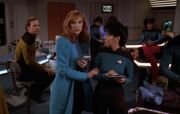
Dr. Crusher and Nurse Ogawa manage a busy day in sickbay
In sickbay , Nurse Alyssa Ogawa removes spines from Commander Riker 's back; an accident while he was in the arboretum with Rebecca Smith had resulted in a close encounter with a Cypirion cactus . Meanwhile, Lieutenant Barclay , having diagnosed himself with a lethal illness , goes to see Doctor Crusher – who assures him that he in fact is not suffering from any lethal illness at all, but instead has a mild case of Urodelan flu . Humans typically exhibit a natural immunity to the flu, but since the T-cells that would normally fight off the infection are dormant, she activates that particular gene with a synthetic T-cell to let his body fight the infection naturally. Data soon arrives carrying his cat , Spot . The cat is here for a routine check on the progress of her pregnancy ; she is expected to deliver before the end of the week. The talk of babies prompts Ogawa to reveal that she is herself pregnant with her husband 's child, prompting congratulations from Crusher.
Act One [ ]
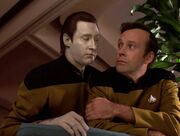
" Goodbye, Spot. I believe you are in good hands. " " You have nothing to worry about, sir. "
On the bridge , Lieutenant Worf's new weapons guidance system is being put to the test. However, out of three photon torpedoes launched, only two hit their intended targets, while the third swerves off course. With the USS Enterprise -D unable to follow and disable the other torpedo due to a dense asteroid field ahead, Captain Picard and Data leave the ship to disarm the torpedo via a shuttlecraft . Before they leave, however, Data asks Picard if he can attend to a personal matter first. In his quarters , Data asks Barclay to watch over Spot. The cat might deliver before his return, and Barclay is one of the few people that Spot tolerates, and Data would prefer a Human to supervise Spot's birthing process.
As time passes on the Enterprise , several crewmembers begin to start displaying strange behavior. After being ordered to take a break from checking the problems with the guidance system, Worf shows signs of becoming increasingly irritable and very hungry. Meanwhile, Counselor Troi finds the atmosphere on the ship too dry and cold, constantly changing around the ambient temperature and humidity levels and consuming large amounts of salty foods and water . That night, Worf's behavior degenerates further and becomes more primal: he rips up his bed and sleeps tensely on the floor.
Act Two [ ]
In engineering , Lieutenant Barclay shows his own strange behavior. He seems unusually energetic, speaking so rapidly that La Forge and Riker are having difficulty keeping up with him. Riker's inability to keep up with Barclay is compounded by his own problems; he is having trouble with his memory and higher thinking.
On the bridge, Troi (currently on watch) keeps trying to raise the temperature, and Worf keeps turning it back down: complaining that she is making it too hot. Troi finally leaves the bridge to take a bath in her quarters.
A problem detected in engineering has Barclay and La Forge in the Jefferies tubes . Barclay finds and rapidly bypasses a ruptured plasma conduit . As he does, La Forge detects cholic acid around the hole in the bulkhead where the ruptured line was located. The bulkhead and conduit seems to have been dissolved by an organic solvent. But in contrast to Barclay's increasing hyperactivity, La Forge seems increasingly lethargic. Barclay suggests a biospectral analysis ; La Forge agrees before deciding to take a break.
The changes being experienced by the crew continue to progress. Riker finds himself unable to either remember the recent weapons testing or respond to a Starfleet request for a report on the matter. Troi sits in her bath tub , wearing her Starfleet uniform , trying to stay wet when Worf suddenly enters her quarters, approaches Troi, and bites her cheek.
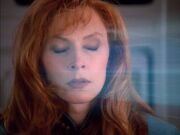
Crusher is sprayed with venom by Worf
Both Troi and Worf are taken to sickbay, and Crusher quickly notices the changes. When Ogawa adds that more of the crew are experiencing symptoms, but while some are also finding the temperature too cold like Troi, there are others who have developed fevers , leading Crusher to conclude that something is spreading around the ship. She then turns her attention to Worf who is completely unresponsive to her questions, and notices something else: he has swellings under his jaw that appear to be venom sacs . They prove to be just that when Crusher asks him to open his mouth, and Worf suddenly sprays venom in Crusher's face, then flees sickbay before he can be captured, while Ogawa and another nurse rush to aid Crusher, who is in extreme distress.
In the observation lounge , Ogawa reports that she got Crusher into stasis before she became paralyzed by the venom. She will require reconstructive surgery, but Ogawa believes she will be all right. However, there is still the problem of the mysterious illness that is affecting the crew. Barclay reports that the venom that affected Crusher has been found in other parts of the ship, including at the ruptured plasma conduit seen earlier. Riker admits to his inability to think straight; he can't think properly when La Forge (now serving as acting first officer ) reports on having trouble locating Worf's life signs on sensors , and despite having seven security teams looking for him. He dismisses the senior staff and tries to send a subspace message to Starfleet concerning their problem, but finds himself unable to recall the command codes required.
Act Three [ ]
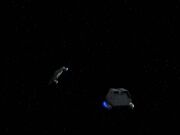
The Enterprise adrift
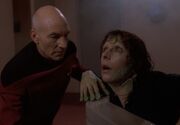
" Deanna? "
Picard and Data are a little puzzled to not be able to locate the Enterprise , as the ship is not at the prearranged coordinates. A quick search locates the ship, visibly adrift. Upon docking, they ascertain that the ship's main power systems are down, environmental systems are configured strangely, and where there should be over a thousand humanoid lifeforms there seems to be a near-equal number of myriad creatures. Some of the characteristics are inconsistent with those of the known crew, such as casting off skin like a reptile . They come upon Troi's quarters where upon entering, the humidity of her quarters was altered by the condensation of the room. They discover her in her bath tub, having somehow transformed into an amphibian -like creature. It is their first clue that the crew is undergoing unusual changes.
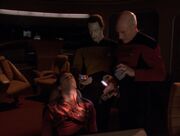
Data and Picard discover Ensign Dern 's body
Seeking to stabilize the ship, they then go to the bridge, finding it in shambles, with Ensign Dern found dead at the conn (from what appears to be an animal attack), his spine fractured in three places; he had also been affected, but was killed before undergoing any significant changes. From the bridge, Data is able to note that the crew is still on board the ship but in a similar state to that of Troi. Many of them have been gravitating towards water (the aquatic lab) and plants (the arboretum). Picard is unable to restore power to the ship due to the entire power-transfer grid being damaged. Suddenly, they hear a noise coming from the captain's ready room . There they discover Riker, now a brutish proto-Human, attacking the captain's aquarium (in which Livingston , the captain's lionfish , has also de-evolved into a jellyfish ). When he charges them, Data stuns Riker with his phaser. Based on what they've encountered so far, Data announces his hypothesis that the crew is de-evolving.
Act Four [ ]
Troi and Riker are taken to sickbay for further analysis. Data, after analyzing Riker's DNA , discovers that a synthetic T-cell has invaded his genetic codes and has begun to activate his latent introns , a result of Crusher's treatment of Barclay. He explains that introns are genetic codes which are normally dormant; they are sequences of DNA which provided key physical and behavioral characteristics millions of years ago but are no longer necessary. Counselor Troi's gill -slits and other amphibious characteristics, for example, are derived from introns which contain amphibious codes. Because introns can include genetic material from many different species over millions of years of evolution , it is possible that a wide variety of transformations is occurring among the crew. Since all humanoid life has a similar genetic pattern, the virus will work similarly on all non-Human lifeforms as well, and they will each be de-evolving to earlier forms of life in their homeworlds . He informs Picard that he has also been infected by the intron virus and is now slowly de-evolving into an earlier form of primate , such as a lemur or a pygmy marmoset .
Realizing that they do not have much time, they decide to act quickly. Since Data's computer in his quarters operates independently from the ship's computer and is probably still intact, they decide to go there in order to examine the situation further. Arriving at his quarters, Data notices that Spot, who has been expecting a litter of kittens , has finally given birth. A further search finds an iguana wearing her collar; they soon realize that the reptile is Spot and that the intron virus is capable of also affecting non-humanoids. Her kittens, however, do not seem to have been affected by the virus that has been plaguing the rest of the crew. Given that Spot's kittens are unaffected, Data and Picard conclude that the placental barriers and amniotic fluid that serve as a filtration system to protect the fetus in the placenta have probably prevented the intron virus from being passed on from Spot to her kittens. They decide that they probably can inhibit the intron virus by using the natural antibodies in Spot's amniotic fluid. However, in order for it to be effective on humanoid crewmembers, humanoid antibodies would be necessary. Recalling that Nurse Ogawa is expecting, they track her down to the arboretum. But before they can begin tracking her down, a failure in a warp plasma vent forces them to detour to main engineering so Data can program repairs. While checking on the status of the warp core , Picard is frightened by the sudden appearance of Barclay, partially transformed into a spider . Data surmises that his terror at the sight (a result of the heightened sense of awareness found in small primates) is an initial symptom of Picard's de-evolution; they need to hurry.
They locate Ogawa (who is apparently partially de-evolved into a proto-Human) and Data begins to analyze Ogawa's fetus, confirming that it is not affected by the virus. He says that he can use her amniotic fluid as a template for a retrovirus which in turn would neutralize the synthetic T-cell and re-establish the genetic patterns of each host. While working on finding a way to most quickly address the situation, something pounds on the sickbay door. Life sign scans show something big, armored, and Klingon ; it is Worf.
Act Five [ ]
A transformed Worf tries to force his way into sickbay. He appears to be seeking something or someone particular. Picard notices that the bite Worf gave Troi was not to hurt her but rather seemed part of a mating process, and that it appears as if Worf had come back for her. The situation becomes increasingly dangerous as an ever angrier and aggressive Worf almost breaks through the door. Data and Picard cannot just abandon Troi and the others in sickbay, but at the same time, Data needs to continue with his analysis of the amniotic fluid. Picard, who is beginning to experience the effects of the virus himself, suggests distracting Worf and luring him away from sickbay. He suggests extracting pheromones from Troi's sebaceous glands to lure Worf away from sickbay so that Data can continue his work and the others remain safe, over Data's objections.
While Data continues work on the retrovirus, Picard leads Worf on a chase through the Enterprise 's corridors until becoming cornered at the ruptured warp plasma conduit La Forge and Barclay had been repairing earlier. Picard improvises, sitting upon the insulated access panel and using the bypassed conduit to send electricity through the Jefferies tube, knocking out Worf. At that moment, Data reports that he has completed the retrovirus. It will make the introns in the crew dormant again; at Picard's consent, he floods the ship with a gaseous form of the new virus, turning the crew back to normal. Before that happens, Picard mentions to Worf his hope that when he wakes up, he'll be a new man.
In sickbay, Barclay nervously asks Dr. Crusher if all this was his fault. She states that actually it was her fault for having activated a dormant T-cell which, in turn, activated all dormant T-cells (including the introns). She suggests naming the virus after Barclay, calling it Barclay's Protomorphosis Syndrome . Jokingly, she tells Troi that Barclay not only de-evolved into a spider, but also had a new disease named after him. Troi sighs, and comments that she'd better clear her calendar for the next few weeks.
Memorable quotes [ ]
" Reg, you don't have Terellian Death Syndrome ! " " Are you… you're sure? " " I'm sure. "
" I have spent the past nine weeks as an expectant parent. I would be happy to share my insights with your husband . If my experience is any indication, he will need all the help he can get. "
" The torpedo is out of range. " " Even for your newly improved phasers? "
" Mr. Worf… I think that you should consider analyzing your new guidance system. "
" Doctor! My capillaries are shrinking!"
" She's such a sweet little kitty. " " She is to you. "
" Do not approach me unannounced – especially while I am eating. "
" Worf… open your mouth. "
" Are you saying that Worf is spraying this… " " VENOM! " " …this venom… all over the ship? " " I'd say so! "
" Well… before I begin swinging through the ship, looking for breakfast, we need to find some answers. "
" What – what's that? " " It is large, approximately two hundred kilograms. It is heavily armored with an exoskeleton. Life signs appear to be… Klingon. " " Worf! "
" Do you think he sees us as prey? " " There are crewmembers in the corridors and other sections of the ship. It would be easier for him to capture and consume one of them than attempt to break through a door. "
" Well, Mr. Worf… let's hope when you wake up, you're a new man. "
" He transformed into a spider… and now he's had a disease named after him. " " I think I'd better clear my calendar for the next few weeks. "
Background information [ ]
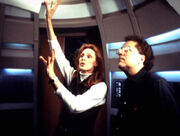
McFadden and director of photography Jonathan West
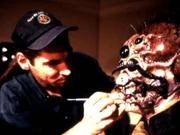
Dwight Schultz and his makeup artist Mike Smithson
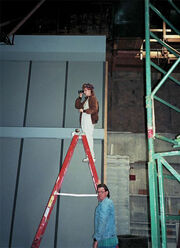
McFadden sets up a shot
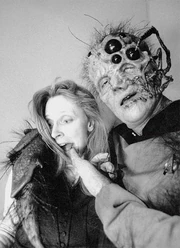
McFadden and Schultz between takes
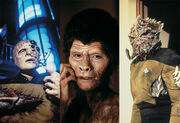
Detailed makeup design
Production history [ ]
- Final draft script: 7 January 1994 [1]
- Premiere airdate: 21 March 1994
- First UK airdate: 15 May 1996
- It was written into the script that Gates McFadden's character, Beverly Crusher, would be severely disfigured by Worf. She was promptly put into stasis to prevent the injuries from worsening. The absence of Dr. Crusher from much of the episode gave the actress who played her, Gates McFadden , more time to spend directing the episode. ( Star Trek Encyclopedia , 2nd ed., p. 92)
Production [ ]
- This is the only episode of the series directed by Gates McFadden ( Beverly Crusher ), and the first episode of Star Trek directed by a female cast member. The next episode directed by a female cast member was VOY : " Riddles ", directed by Roxann Dawson six years later.
- Michael Westmore described his work in this episode as proving to be his greatest challenge. " Everybody mutated – Riker became an Australopithecine, Troi an aquatic animal, Barclay a spider, " he recalled. " We never would have been ready if the episode hadn't miraculously fallen right after Christmas . We worked through the holiday. " ( Star Trek 30 Years , p. 47)
Sets and props [ ]
- The chair in Worf's quarters was also seen in the episodes " Peak Performance ", " Family ", " Reunion ", " Redemption ", " New Ground ", " Cost Of Living ", " A Fistful of Datas ", " Birthright, Part I ", " Parallels ", and " Firstborn " and was used as the command chair aboard the Tarellian starship in the first season episode " Haven ". It was designed by Peter Opsvik. [2]
- Worf's quarters also feature the statue of Kahless and Morath , which can also be seen in " Peak Performance ", " Reunion ", " New Ground ", " Cost Of Living ", and " Firstborn ".
Continuity [ ]
- This episode marks the fifth and final appearance of Reginald Barclay (played by Dwight Schultz ) on the series. He was seen again with the Enterprise crew in Star Trek: First Contact , and also appeared in six episodes of Star Trek: Voyager .
- This is the first episode since her promotion that Counselor Troi is seen in command of a duty shift on the bridge. When Picard and Data are later stood outside Troi’s quarters, the nameplate on the door still shows her former rank of lieutenant commander .
- The events of this episode follow Dr. Crusher telling Alyssa Ogawa in " Lower Decks " that she'll support her promotion . Here, Ogawa is seen as a lieutenant for the first time.
- Toward the end of the episode, Dr. Crusher comments to Barclay that it is traditional to name new diseases after the first patient. This tradition, evidently, appeared after our own time period. Eponymous diseases have almost always been named for the first person to describe them in medical literature ( Parkinson's disease ; Down syndrome ; Marfan syndrome ; Kartagener's syndrome ). Rare exceptions from our time include Legionnaires' disease (named for a group of people ) and Lou Gehrig's disease (unofficially named for a famous – though not the first – sufferer ).
- A crewmember, who has de-evolved into a humanoid who shed his/her skin like a snake
- Dern , who had begun to de-evolve before being killed by either Riker or Worf
- Deanna Troi , who has de-evolved into an amphibian
- William T. Riker , who had de-evolved into an Australopithecine
- Livingston , Picard's lionfish , de-evolved into a jellyfish
- Jean-Luc Picard , who had begun to de-evolve (according to Data ) into a lemur or pygmy marmoset
- Spot , who had de-evolved into an iguana
- Reginald Barclay , who had de-evolved into a spider -like creature
- Alyssa Ogawa , who had de-evolved into an ape -like humanoid
- Worf , who had de-evolved into a prehistoric proto- Klingon
- Coincidentally, Barclay mentioned that spiders never bothered him in " Realm Of Fear " (also written by Brannon Braga).
Reception [ ]
- In 2015, WhatCulture ranked this the 7th best episode of all time in the Star Trek science fiction universe. They note it as a horror-themed episode of Star Trek , remarking that "' Genesis' is terrifying in the way it unfolds so very subtly, watching the crew regress into primal animals".
- In 2017, Io9 noted "Genesis" for being one of the more bizarre science-fiction stories of the franchise, noting how different characters devolved into frightening creatures, such as Worf turning into a giant super-Klingon that hunted other crew members.
- In 2018, TheGamer ranked this one of the top 25 creepiest episodes of all Star Trek series.
- This episode won an Emmy Award for Outstanding Individual Achievement in Sound Mixing for a Drama Series; it was also nominated for Outstanding Individual Achievement in Sound Editing for a Series and Outstanding Individual Achievement in Makeup for a Series.
- This episode received Star Trek 101 's "Spock's Brain" Award for Worst Episode in The Next Generation .
Video and DVD releases [ ]
- UK VHS release (two-episode tapes, CIC Video ): Volume 86, 22 August 1994
- As part of the TNG Season 7 DVD collection
Links and references [ ]
Starring [ ].
- Patrick Stewart as Capt. Jean-Luc Picard
- Jonathan Frakes as Cmdr. William T. Riker
Also starring [ ]
- LeVar Burton as Lt. Cmdr. Geordi La Forge
- Michael Dorn as Lieutenant Worf
- Gates McFadden as Dr. Beverly Crusher
- Marina Sirtis as Counselor Deanna Troi
- Brent Spiner as Lt. Commander Data
Guest stars [ ]
- Patti Yasutake as Alyssa Ogawa
- Dwight Schultz as Barclay
Co-stars [ ]
- Carlos Ferro as Ensign Dern
- Majel Barrett as Computer Voice
Uncredited co-stars [ ]
- Shawn Belschner as Ten Forward waiter
- Brandy as Spot
- Bud as Spot
- Debbie David as Russell
- Cameron as Kellogg
- Tracee Lee Cocco as Jae
- Fumiko Hamada as Female command division officer
- Gary Hunter as sciences division officer
- Lorine Mendell as Diana Giddings
- Rad Milo as operations division ensign
- Monster as Spot
- Keith Rayve as a civilian
- Rick Ryan as Fletcher
- John Tampoya as operations division ensign
- Oliver Theess as command division officer
- Margie Thomas as command officer
- Tyler as Spot
- Willie as Spot (lizard form)
- Command division officer
- Female sciences division officer
- Operations division officer
- Spot's kittens
- Ten Forward waitress
Stunt doubles [ ]
- Rusty McClennon as stunt double for Michael Dorn
- Stunt double for Jonathan Frakes
- Stunt double for Marina Sirtis
Stand-ins [ ]
- David Keith Anderson – stand-in for LeVar Burton
- Debbie David – stand-in for Brent Spiner
- Michael Echols – stand-in for Michael Dorn
- Nora Leonhardt – stand-in for Marina Sirtis
- Lorine Mendell – stand-in for Gates McFadden
- Richard Sarstedt – stand-in for Jonathan Frakes
- Dennis Tracy – stand-in for Patrick Stewart
References [ ]
50 million years ago ; amniotic fluid ; amniotic scan ; amphibian ; amphibious lifeform ; appetite ; aquatics lab ; arachnid ; arboretum ; artery ; asteroid field ; attitude control ; australopithecine ; Barclay's Protomorphosis Syndrome ; bath tub ; behavioral characteristic ; Betazoid ; bioacidic compound ; biobed ; biology ; bioscan ; biospectral analysis ; biospectral scan ; blurred vision ; Brooks ; bulkhead ; burp ; capillary ; cats ; caviar ; centigrade ; cholic acid ; collar ; conduit ; corrosion ; Cypirion cactus ; de-evolve ( devolve ); department ; dizziness ; DNA ; DNA analysis ; Earth ; electrophoretic activity ; enzymatic agent ; epidermal layer ; feline ; fever ; field test ; filtration system ; Galaxy class decks ; Hacopian ; Hayes ; headache ; hemotoxin series ; hominid ; Hypatia ; hyper-evolution ; hypochondria ; hypothalamic series ; iguana ; immunity ; intravascular pressure ; intron ; Jefferies tube ; K-3 cell ; K-3 cell count ; kitten ; Klingon ; Klingon food ; lemur ; level 2 security alert ; level 4 diagnostic ; litter ; Livingston ; medical tricorder ; microcellular scan ; molting ; mutation ; nausea ; neck ; nictitating membrane ; Number one ; Ongilin caviar ; palpitations ; pheromones ; photon torpedo ; physical characteristic ; placental barrier ; Powell, Andrew ; power transfer grid ; prenatal behavior ; pygmy marmoset ; reconstructive surgery ; relative humidity ; reptilian ; retrovirus ; ribocyatic flux ; saliva ; salty ; sebaceous gland ; Sector 21527 ; Selar ; sense of smell ; sex ; shivering ; shock ; Shuttlebay 2 ; shuttle pilot ; sickbay ; Smith, Rebecca ; solvent ; spinal column ; Spot's kittens ; spread pattern ; Starfleet Medical Database ; stasis ; Symbalene blood burn ; symptom ; T-cell ; Terellian Death Syndrome ; temperature ; Type 6 shuttlecraft ; Urodelan flu ; venom ; vocalization ; weapon systems
Library computer references [ ]
Starship mission status : Ajax , USS ; Alderaan ; Alpha Laputa IV ; Ambassador -class ; Apollo -class ; Aries , USS ; Beta Cygni system ; Bradbury , USS ; Bradbury -class ; Charleston , USS ; Constellation -class ; Excelsior -class ; Fearless , USS ; Goddard , USS ; Hood , USS ; Korolev -class ; Merced -class ; Merrimac , USS ; Monitor , USS ; Nebula -class ; pulsar ; Renaissance -class ; Repulse , USS ; Romulan Neutral Zone ; sector ; Sector 21396 ; Sector 21538 ; Sector 22358 ; Sector 22846 ; Sector 22853 ; Sector 23079 ; Starbase 134 ; Starbase 434 ; Thomas Paine , USS ; Trieste , USS ; Victory , USS ; Vulcan Science Academy ; warp drive ; Zhukov , USS
Unused production materials [ ]
ammonia ; methane ; uric acid
External links [ ]
- " Genesis " at Memory Beta , the wiki for licensed Star Trek works
- " Genesis " at Wikipedia
- " Genesis " at MissionLogPodcast.com , a Roddenberry Star Trek podcast
- "Genesis" script at Star Trek Minutiae
- " Genesis " at the Internet Movie Database
- 1 Daniels (Crewman)

IMAGES
VIDEO
COMMENTS
The Genesis II Device was a device based on Project Genesis, similar in configuration to the original Genesis Device from the 2280s. As of 2401, it was stored at Daystrom Station. ... Star Trek XV; Undeveloped. Phase II; Planet of the Titans "Kirk Meets JFK" The First Adventure; The Beginning; Star Trek 4; 24th century. TNG. Will Riker; Data ...
Star Trek II: The Wrath of Khan is a 1982 American science fiction film directed by Nicholas Meyer and based on the television series Star Trek. ... Learning of the Genesis Device, Khan attacks space station Regula I, where the device is being developed by Kirk's former lover, Dr. Carol Marcus, and their son, David.
Genesis II is a 1973 American made-for-television science fiction film created and produced by Gene Roddenberry and directed by John Llewellyn Moxey. The film, which opens with the line, "My name is Dylan Hunt. My story begins the day on which I died", is the story of a 20th-century man thrown forward in time, to a post-apocalyptic future, by an accident in suspended animation.
Star Trek's Genesis Device was a revolutionary and dangerous technology introduced in Star Trek II: The Wrath of Khan, and a second version of Genesis appeared in Star Trek: Picard season 3.Created by Dr. Carol Marcus (Bibi Besch) and her son, David Marcus (Merritt Butrick) at space station Regula I in 2285, Genesis was intended to solve problems involving overpopulation and food supply in the ...
(Star Trek: Deep Space Nine Companion, p. 103) Apocrypha [] The novels Star Trek: The Wrath of Khan and Star Trek III: The Search for Spock indicated that the Genesis wave absorbed Reliant, along with all the gas and dust of the Mutara Nebula, which was used as raw material to create the Genesis planet. They also state the Genesis Device was ...
The Genesis simulation graphics sequence was created for Star Trek II by Lucasfilm's Graphics Group. The footage was later reused in Star Trek III and Star Trek IV. The Project Genesis simulation or demonstration graphics sequence, has been invariably referred to ever since as the "Genesis Demo" by production staff and reference authors alike.
Star Trek II: The Genesis of the "Genesis Trilogy" Paramount Pictures. Enter producer Harve Bennett, who took over the production. Coming from Paramount's television division, he promised to ...
Gene Roddenberry, the creator of Star Trek, brings fans another enthralling tale of the future. Set in a time between now and the era of the starship Enterprise, Genesis II follows Hunt (Alex Cord), who awakes after 154 years of suspended animation into a post-apocalyptic world that's torn between the peace-loving citizens of Pax and the ...
Star Trek II: The Wrath of Khan: Directed by Nicholas Meyer. With William Shatner, Leonard Nimoy, DeForest Kelley, James Doohan. With the assistance of the Enterprise crew, Admiral Kirk must stop an old nemesis, Khan Noonien Singh, from using the life-generating Genesis Device as the ultimate weapon.
Genesis II. "My name is Dylan Hunt. My story begins the day on which I died.". Gene Roddenberry, the creator of Star Trek, brings fans another enthralling tale of the future. 627 1 h 13 min 2016. X-Ray 7+.
A brief "behind the scenes" commentary on the making of the Genesis effect from Star Trek II: The Wrath of Khan. Created in 1982 by the Lucasfilm computer gr...
About Press Copyright Contact us Creators Advertise Developers Terms Privacy Policy & Safety How YouTube works Test new features NFL Sunday Ticket Press Copyright ...
Genesis II was released with some fanfare in 1973, with coverage in TV Guide and national newspapers, mostly enthusiastic about Roddenberry's return to television and the Star Trek-like elements ...
Star Trek: The Motion Picture's script was written to be an episode of Genesis II. (and was in turn, stolen from an older episode of Star Trek! (Earth satellite comes back looking for its maker)) Andromeda uses two of the characters' names (Dylan Hunt and Harper Smythe)though it has little to do with the original concept.
ML: " Star Trek II: The Wrath of Khan ". "At the end of the universe lies the beginning of vengeance." Admiral James T. Kirk faces his greatest challenge yet. Suffering through doubts about his place in the galaxy, he is thrust into action once more against his most bitter foe - Khan Noonien Singh, who has escaped his exile on Ceti Alpha V ...
"My name is Dylan Hunt. My story begins the day on which I died." Gene Roddenberry, the creator of Star Trek, brings fans another enthralling tale of the future. Set in a time between now and the era of the starship Enterprise, Genesis II follows Hunt (Alex Cord), who awakes after 154 years of suspended animation into a post-apocalyptic world that's torn between the peace-loving citizens of ...
Genesis II "My name is Dylan Hunt. My story begins the day on which I died." Gene Roddenberry, the creator of Star Trek, brings fans another enthralling tale of the future. 1 h 13 min 2016. X-Ray 7+ Science ...
Genesis II is the story of contemporary NASA scientist Dylan Hunt, here played by Alex Cord, getting trapped inside his own suspended animation experiment for 160 years. If the name Dylan Hunt ...
Get all the details on Star Trek II: The Wrath of Khan: The Genesis Device. Description, analysis, and more, so you can understand the ins and outs of Star Trek II: The Wrath of Khan. ... And there's a literary tradition that covers this too, though Star Trek II never makes direct reference to it. Once upon a time, there was a doctor named ...
The original Project Genesis animation included in the movie Star Trek 2 was a monumental achievement in CGI at the time. This original animation is a tribut...
Gene Roddenberry's first attempt at a new sci-fi series after Star Trek. A late 70's suspended animation test at an underground NASA complex goes awry when some kind of earthquake hits and Dylan Hunt (Alex Cord) wakes up 154 years later in a post-apocalyptic world where he finds himself caught between two societies—the underground Pax and the surface-dwelling mutants, the Tyranians.
List of episodes. " Genesis " is the 171st episode of the American science fiction television series Star Trek: The Next Generation and the 19th episode of the seventh season. It was directed by series cast member Gates McFadden, her only directing credit to date. Set in the 24th century, the series follows the adventures of the Starfleet crew ...
In 2015, WhatCulture ranked this the 7th best episode of all time in the Star Trek science fiction universe. They note it as a horror-themed episode of Star Trek, remarking that "'Genesis' is terrifying in the way it unfolds so very subtly, watching the crew regress into primal animals".